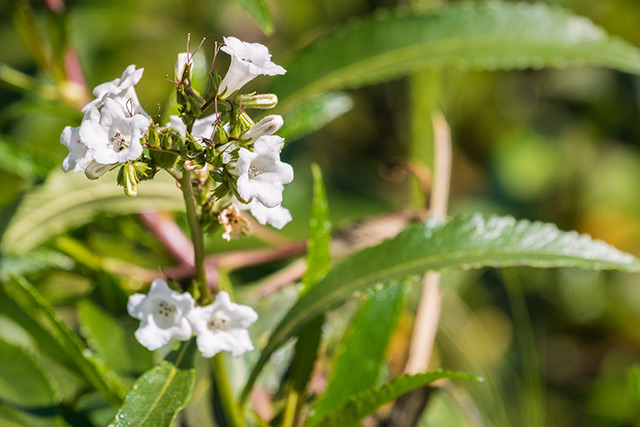California’s “holy herb” found to be an effective natural treatment for Alzheimer’s
09/19/2019 / By Melissa Smith

Alzheimer’s disease is the most common form of dementia, and aging is its primary risk factor. Therefore, researchers continue to look for ways to counter the effects of aging on the brain. In a recent study, researchers from The Salk Institute for Biological Studies discovered a potential natural treatment for Alzheimer’s in the form of a medicinal herb found in California.
In their study published in the journal Redox Biology, they found that yerba santa (Eriodictyon californicum), a plant native to California, contains an active compound called sterubin that could be used to treat people with Alzheimer’s. Yerba santa, which is the Spanish for “holy herb,” is highly regarded as a medicine for respiratory diseases, bruising, fever, headaches, infections, and pain.
In an earlier study, the same team of researchers used a screening method to identify plant compounds that could reduce inflammation and protect nerve cells. From this, they developed a screening tool that can both identify compounds that might protect cells, but also find the target pathways of these compounds.
For the current study, the researchers first examined 400 plant extracts with known medicinal properties for their ability to prevent oxytosis – a type of cell death that occurs in Alzheimer’s disease – in mouse hippocampal nerve cells.
Extracts that have this ability underwent more tests – some tests used mouse nerve cells, while others used human nerve cells. The researchers investigated the compounds’ ability to prevent the effects of aging on the brain.

The researchers found that sterubin exhibited the greatest protective effect against inflammation and other triggers of brain cell death. In particular, sterubin strongly reduced inflammation in microglia, which are brain cells that provide support to nerve cells.
In addition, the researchers found that sterubin can remove iron from cells, helping to prevent iron accumulation. Iron accumulation can result in a type of nerve cell damage that accompanies aging and occurs in neurodegenerative problems.
“Not only did sterubin turn out to be much more active than the other flavonoids in Yerba santa in our assays, it appears as good as, if not better than, other flavonoids we have studied,” said Pamela Maher, the corresponding author of the study.
Maher and her team are planning to test sterubin using animal models of Alzheimer’s disease to evaluate its efficacy and toxicity levels. This could lead to human testing and eventually be used to treat the dreaded disease.
Preventing Alzheimer’s naturally
Aging is inevitable, but Alzheimer’s isn’t. Here are some things you can do to prevent Alzheimer’s disease:
- Regular exercise – Regular physical activity can cut your risk of developing Alzheimer’s by as much as 50 percent, according to the Alzheimer’s Research & Prevention Foundation. It can also slow further deterioration in people who have already started to develop cognitive problems. For best results, aim for at least 150 minutes of moderate-intensity exercise every week. Include cardio, strength training, and balance and coordination exercises to your routine.
- Socialize – Engaging in social activities may help prevent Alzheimer’s and other forms of dementia. (Related: Neurologists encourage a social lifestyle to help fight dementia: Go out with friends, sing, challenge your brain.)
- Follow a healthy diet – Some foods cause inflammation, while others prevent inflammation. Therefore, it’s important to be watchful of the foods you eat. Several epidemiological studies reported that following a Mediterranean diet can lower your risk of cognitive decline and Alzheimer’s. On the other hand, sugary foods, refined carbs, and trans fat can cause inflammation and increase your risk of not just Alzheimer’s, but also other diseases.
- Exercise your brain – Just as your body needs exercise, so does your brain to keep it active and healthy. A study by the National Institute of Health (NIH) found that older adults who underwent 10 sessions of mental training improved their cognitive functioning in the months after the training until 10 years later.
- Get enough sleep – During sleep, the brain works to form memory and flushes out brain toxins. Disrupted sleep is also a risk factor for Alzheimer’s, according to studies.
- Manage your stress – Too much stress can take a toll on your brain, resulting in shrinkage in a key memory area, disrupting nerve cell growth, and increasing the risk of Alzheimer’s.
Many diseases are preventable with the right balance of healthy diet and active lifestyle. Learn more ways on how to protect your brain from dementia at Alzheimers.news.
Sources include:
Submit a correction >>
Tagged Under:
age-related cognitive decline, Alzheimer's cures, Alzheimer's disease, brain health, brain nutrients, cognitive decline, cognitive health, dementia, disease treatments, Eriodictyon californicum, herbal medicine, Herbs, holy herb, medicinal herbs, natural cures, natural medicine, prevent Alzheimer's, prevent cognitive decline, prevention, remedies, research, sterubin, yerba santa
This article may contain statements that reflect the opinion of the author





















